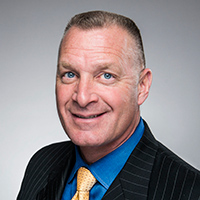An Interest Rate Increase Is Long Overdue
The highly anticipated rise will be good for savers and investors.

Profit and prosper with the best of Kiplinger's advice on investing, taxes, retirement, personal finance and much more. Delivered daily. Enter your email in the box and click Sign Me Up.
You are now subscribed
Your newsletter sign-up was successful
Want to add more newsletters?

Delivered daily
Kiplinger Today
Profit and prosper with the best of Kiplinger's advice on investing, taxes, retirement, personal finance and much more delivered daily. Smart money moves start here.

Sent five days a week
Kiplinger A Step Ahead
Get practical help to make better financial decisions in your everyday life, from spending to savings on top deals.

Delivered daily
Kiplinger Closing Bell
Get today's biggest financial and investing headlines delivered to your inbox every day the U.S. stock market is open.

Sent twice a week
Kiplinger Adviser Intel
Financial pros across the country share best practices and fresh tactics to preserve and grow your wealth.

Delivered weekly
Kiplinger Tax Tips
Trim your federal and state tax bills with practical tax-planning and tax-cutting strategies.

Sent twice a week
Kiplinger Retirement Tips
Your twice-a-week guide to planning and enjoying a financially secure and richly rewarding retirement

Sent bimonthly.
Kiplinger Adviser Angle
Insights for advisers, wealth managers and other financial professionals.

Sent twice a week
Kiplinger Investing Weekly
Your twice-a-week roundup of promising stocks, funds, companies and industries you should consider, ones you should avoid, and why.

Sent weekly for six weeks
Kiplinger Invest for Retirement
Your step-by-step six-part series on how to invest for retirement, from devising a successful strategy to exactly which investments to choose.
Federal Reserve Chairwoman Janet Yellen is at it again—hinting that the time might finally be right to raise interest rates.
Here's hoping it finally happens this year.
What should you do if it does? If you are risk-averse, you can take advantage of the higher yields from bank products such as certificates of deposit, money-market accounts and savings accounts. For those who have exposure to the markets, evaluate your current stock and bond market exposure and make necessary adjustments.
From just $107.88 $24.99 for Kiplinger Personal Finance
Become a smarter, better informed investor. Subscribe from just $107.88 $24.99, plus get up to 4 Special Issues

Sign up for Kiplinger’s Free Newsletters
Profit and prosper with the best of expert advice on investing, taxes, retirement, personal finance and more - straight to your e-mail.
Profit and prosper with the best of expert advice - straight to your e-mail.
The last time the Fed increased rates was December 2015, and an expectation was set at that time—based on the strength of the economy and the labor market—that we would see three to four increases in 2016. So we waited and watched and... nothing.
If the Fed comes through in December, it will be welcome news. As former FDIC Chair Sheila Bair said recently, "We've been keeping interest rates far too low for far too long." The increase needs to be slow and gradual, she told FOX Business Network, "but they need to get on with it."
I agree. The Fed has been roundly criticized by economists and politicians for propping up the U.S. economy, distorting the market and creating a bubble that's doomed to burst. And Yellen has earned a reputation as an interest-rate tease, bouncing back and forth between optimism and pessimism—and taking the American public with her. (The job market is doing well. Yay! But, hold on, there could be significant repercussions from the Brexit. Ohhh!)
Meanwhile, if you're looking for a way to save and invest, you're being punished. If you put your hard-earned dollars in a money-market account or certificate of deposit (you know, the way your risk-averse but savvy-about-saving parents and grandparents did?), you're actually losing money. And you have been for years. Because if you're making 1% interest, and inflation is 1.5% to 2% (those are the Fed's figures, by the way), you're simply not keeping up.
This is especially unfair to older workers who want to move from stocks and bonds to something more conservative as they prepare to retire and to elderly Americans on a fixed income, who rely on interest income to cover their living expenses.
Raise the interest rate, and they'll likely loosen their purse strings, which benefits the economy. And younger investors might learn to keep some money outside of the volatile market—in savings—and use that, instead of credit, to pay for high-ticket items. Imagine that.
We're ready. The Fed's year of waffling sends a message that, when it comes to the economy, at least, things aren't so bad—bumpy, perhaps, but not bottoming out. And a higher interest rate gives the market somewhere to go if things really do go south.
If you remember back to the terrorist attacks in 2001, the interest rates were up around 4% or 5%, which gave the Federal Reserve some wiggle room to reduce rates and bring some calm to the financial markets. When you're at 0%, what are you going to do? There isn't any room left.
Yellen continues to say the Fed's decision on rates will depend on economic data and not a preset timetable. Let's just hope when the increase finally comes, it isn't too little too late.
Christopher A. Murray is a professional financial adviser, insurance professional and president of the Maryland-based Murray Financial Group. He is a Certified Fund Specialist and Board Certified in Mutual Funds.
Kim Franke-Folstad contributed to this article.
Profit and prosper with the best of Kiplinger's advice on investing, taxes, retirement, personal finance and much more. Delivered daily. Enter your email in the box and click Sign Me Up.

Christopher A. Murray is a professional financial adviser, insurance professional and president of the Maryland-based Murray Financial Group. He is a Certified Fund Specialist, Board Certified in Mutual Funds and a Certified Senior Consultant. Murray has produced and hosted the weekly "Your Financial Editor" radio show for 17 years and provides daily business and financial market updates. He is an active member of the National Press Club and has contributed to several publications, including "The Wall Street Journal."
-
 Dow Adds 1,206 Points to Top 50,000: Stock Market Today
Dow Adds 1,206 Points to Top 50,000: Stock Market TodayThe S&P 500 and Nasdaq also had strong finishes to a volatile week, with beaten-down tech stocks outperforming.
-
 Ask the Tax Editor: Federal Income Tax Deductions
Ask the Tax Editor: Federal Income Tax DeductionsAsk the Editor In this week's Ask the Editor Q&A, Joy Taylor answers questions on federal income tax deductions
-
 States With No-Fault Car Insurance Laws (and How No-Fault Car Insurance Works)
States With No-Fault Car Insurance Laws (and How No-Fault Car Insurance Works)A breakdown of the confusing rules around no-fault car insurance in every state where it exists.
-
 For the 2% Club, the Guardrails Approach and the 4% Rule Do Not Work: Here's What Works Instead
For the 2% Club, the Guardrails Approach and the 4% Rule Do Not Work: Here's What Works InsteadFor retirees with a pension, traditional withdrawal rules could be too restrictive. You need a tailored income plan that is much more flexible and realistic.
-
 Retiring Next Year? Now Is the Time to Start Designing What Your Retirement Will Look Like
Retiring Next Year? Now Is the Time to Start Designing What Your Retirement Will Look LikeThis is when you should be shifting your focus from growing your portfolio to designing an income and tax strategy that aligns your resources with your purpose.
-
 I'm a Financial Planner: This Layered Approach for Your Retirement Money Can Help Lower Your Stress
I'm a Financial Planner: This Layered Approach for Your Retirement Money Can Help Lower Your StressTo be confident about retirement, consider building a safety net by dividing assets into distinct layers and establishing a regular review process. Here's how.
-
 The 4 Estate Planning Documents Every High-Net-Worth Family Needs (Not Just a Will)
The 4 Estate Planning Documents Every High-Net-Worth Family Needs (Not Just a Will)The key to successful estate planning for HNW families isn't just drafting these four documents, but ensuring they're current and immediately accessible.
-
 Love and Legacy: What Couples Rarely Talk About (But Should)
Love and Legacy: What Couples Rarely Talk About (But Should)Couples who talk openly about finances, including estate planning, are more likely to head into retirement joyfully. How can you get the conversation going?
-
 How to Get the Fair Value for Your Shares When You Are in the Minority Vote on a Sale of Substantially All Corporate Assets
How to Get the Fair Value for Your Shares When You Are in the Minority Vote on a Sale of Substantially All Corporate AssetsWhen a sale of substantially all corporate assets is approved by majority vote, shareholders on the losing side of the vote should understand their rights.
-
 How to Add a Pet Trust to Your Estate Plan: Don't Leave Your Best Friend to Chance
How to Add a Pet Trust to Your Estate Plan: Don't Leave Your Best Friend to ChanceAdding a pet trust to your estate plan can ensure your pets are properly looked after when you're no longer able to care for them. This is how to go about it.
-
 Want to Avoid Leaving Chaos in Your Wake? Don't Leave Behind an Outdated Estate Plan
Want to Avoid Leaving Chaos in Your Wake? Don't Leave Behind an Outdated Estate PlanAn outdated or incomplete estate plan could cause confusion for those handling your affairs at a difficult time. This guide highlights what to update and when.